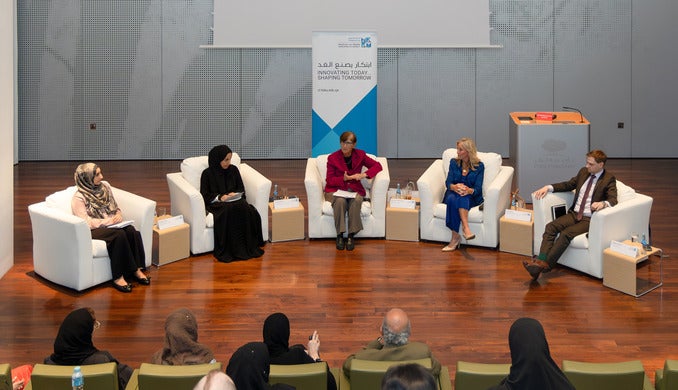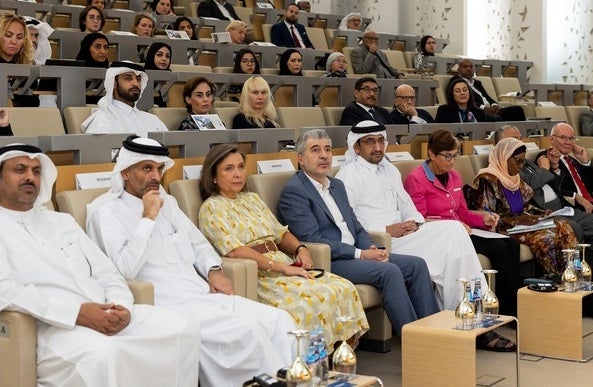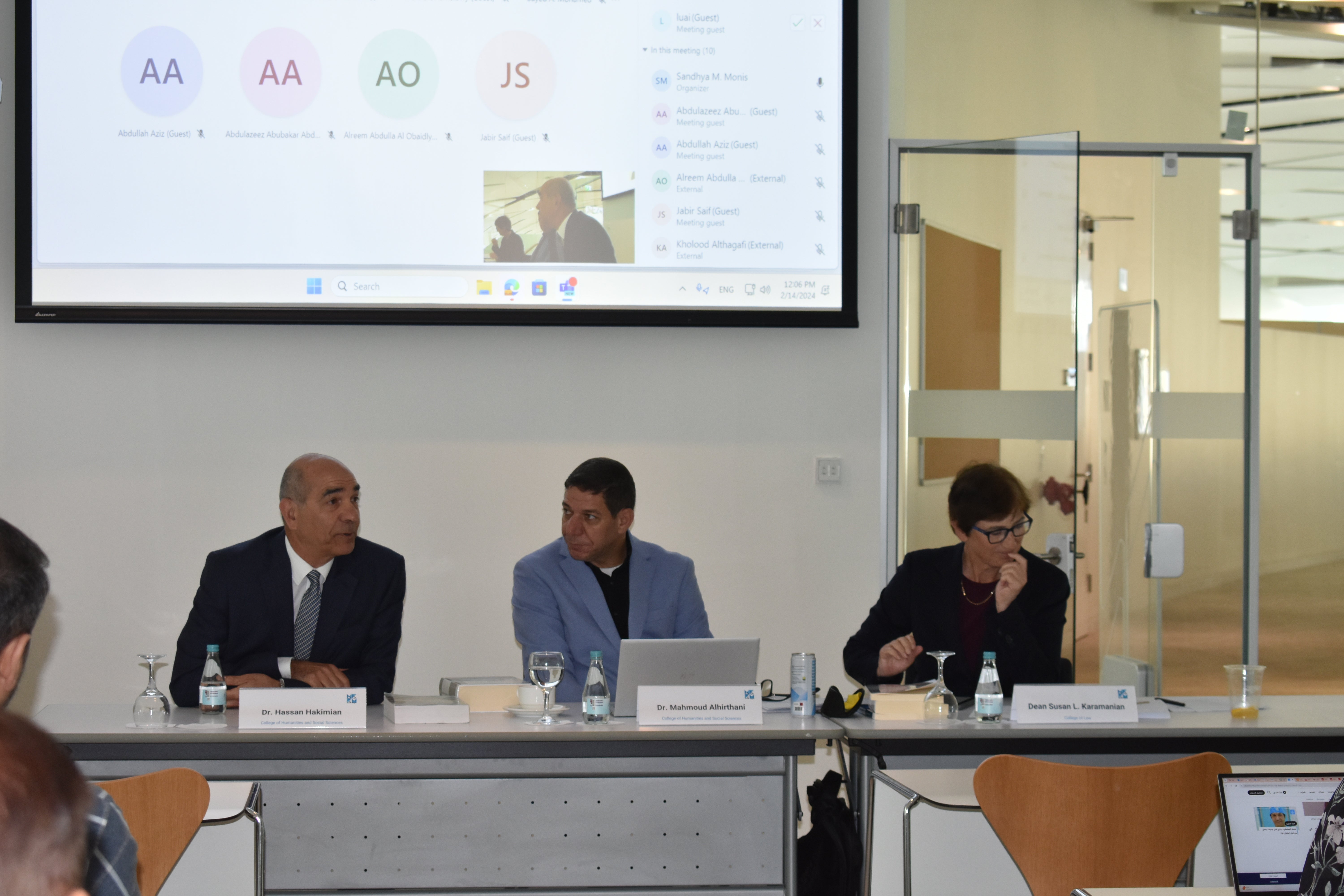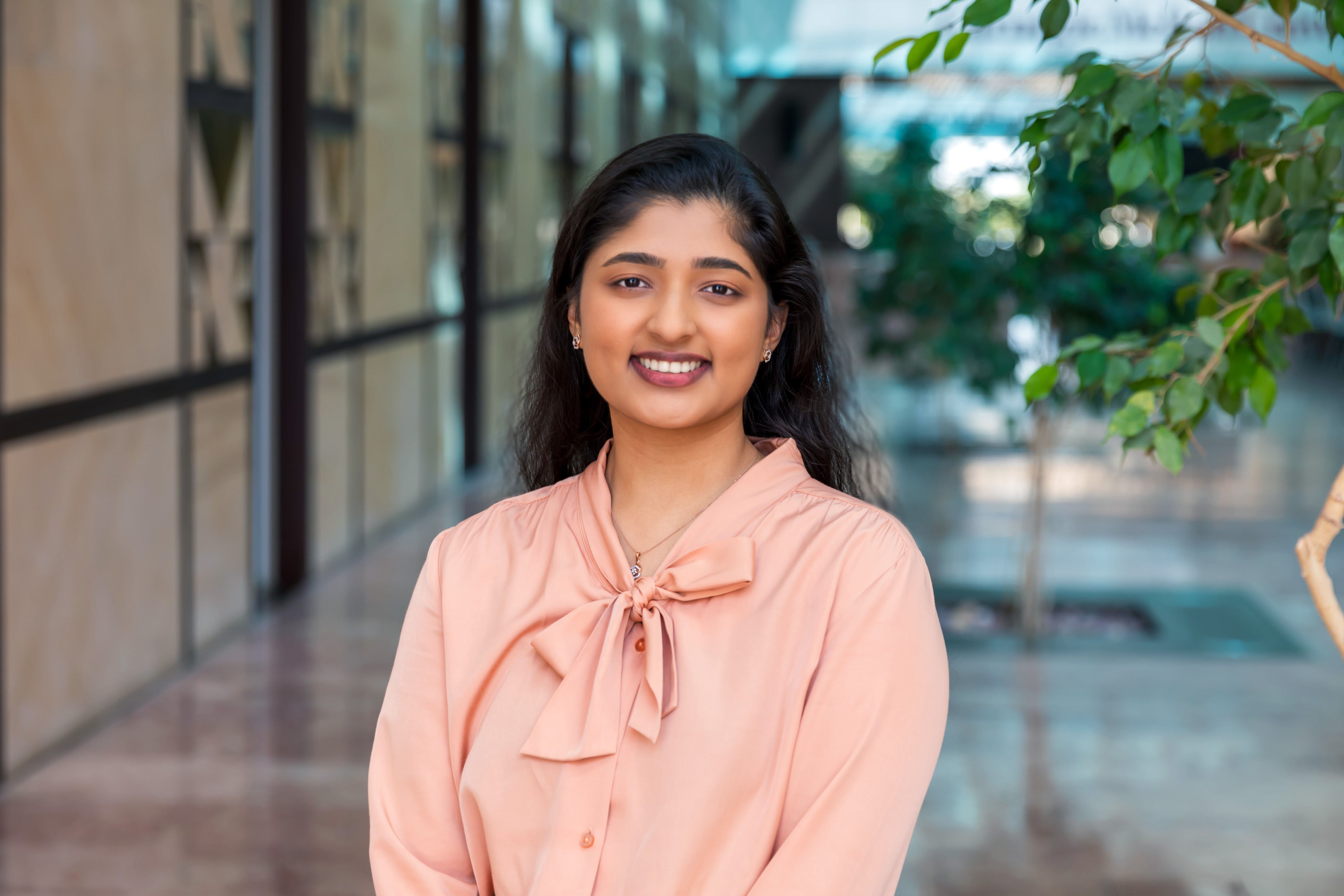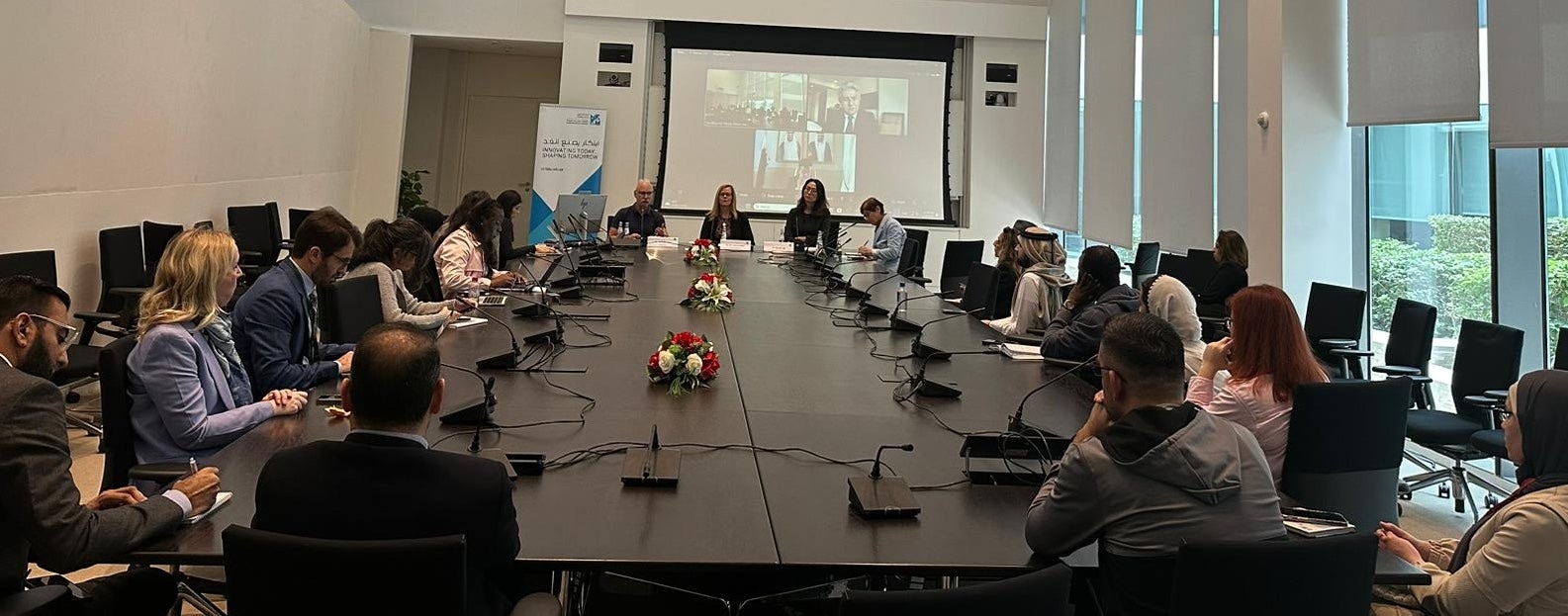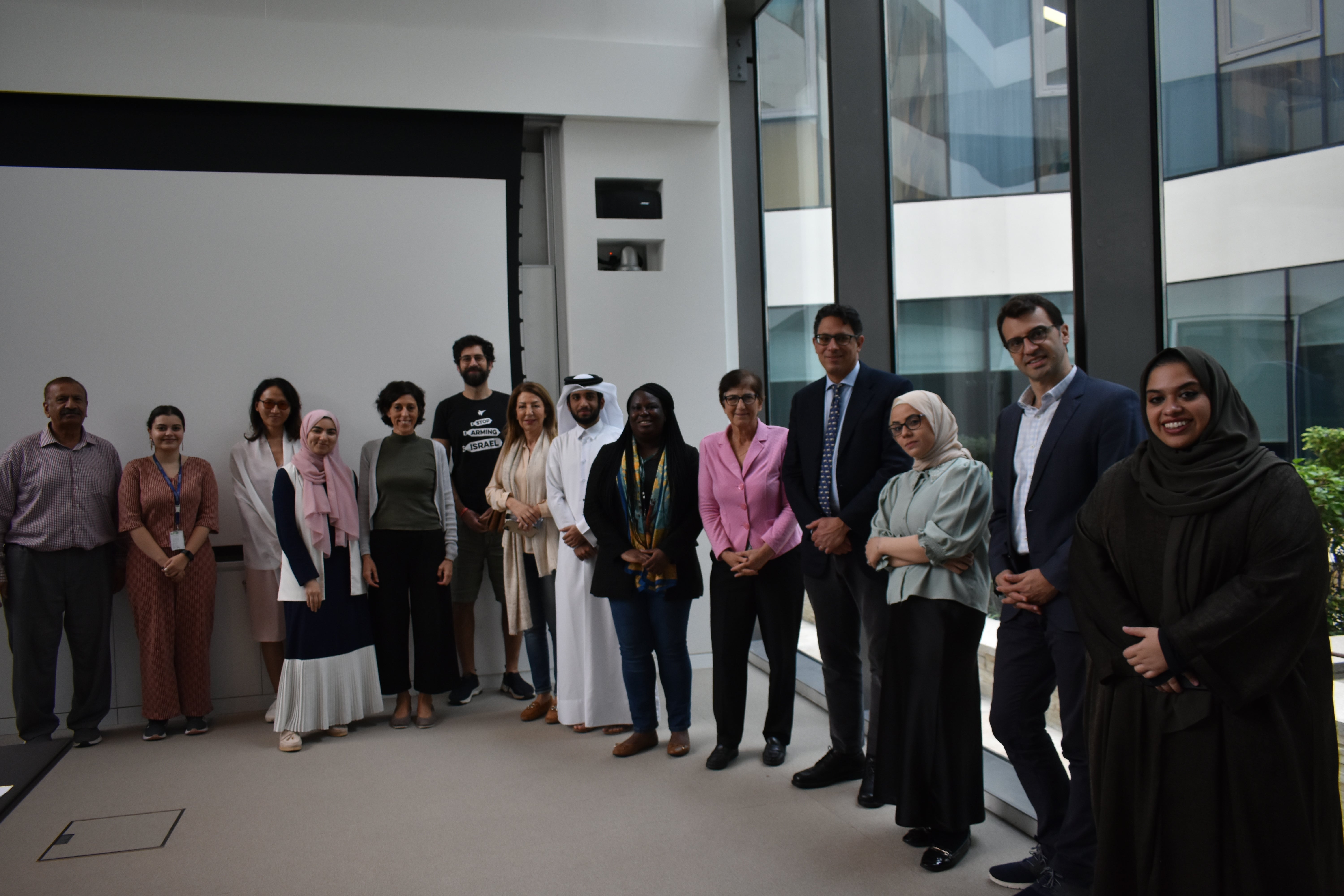
HBKU College of Law and Dialogue Foundation Co-Host Conference on Mediation and the UN Sustainable Development Agenda
Event featured Joyce Aluoch, Former Vice-President of ICC, and HE Paolo Toschi, Ambassador of Italy to the State of Qatar

Hamad Bin Khalifa University’s (HBKU) College of Law and The Dialogue Through Conflict Foundation (Dialogue Foundation) recently co-hosted ‘The Role of Mediation in the United Nations Sustainable Development Agenda.’
The latest in the Dialogue Foundation’s Sleeping Beauty Conference Series, the hybrid event was held at Minaretein, Education City. Participants included academics and professionals from the fields of mediation, conflict resolution, and international law who shared insights into key initiatives and proposals to strengthen the framework of mediation.
Respected leaders from the international legal sector, including Joyce Aluoch, Former Vice-President, International Criminal Court (Nairobi) and Hakan Öztatar, Directorate General of Civil Law Affairs, Ministry of Justice for Turkey, also participated in the conference.
His Excellency Paolo Toschi, Ambassador of Italy to the State of Qatar, Dean Susan L Karamanian, HBKU College of Law, and Giuseppe De Palo, Founder and President, Dialogue Foundation, launched the conference with a roundtable that emphasized how dialogue and rapprochement are key to fulfilling the UN Sustainable Development Goals.
“Mediation is a powerful tool that, if used properly, can help societies promote access to justice, achieve peaceful settlement of disputes, and support inclusive society - key objectives under the UN Sustainable Development Agenda. By partnering with the Dialogue Foundation, the College of Law upholds its commitment to working closely with international partners to build expertise and address legal issues of profound relevance to Qatar, the region, and beyond,” said Dr. Karamanian.
The panel discussions centered on three major topics beginning with the Sustainable Conflict Global Initiative, which emphasizes that mediation contributes to the UN Sustainable Development Agenda goals covering access to justice and achieving peaceful and inclusive societies. Participants also discussed challenges and opportunities in the field of Alternative Dispute Resolution (ADR) throughout the region, as well as how mediation is a ‘sleeping beauty’ that could be awoken by adopting an approach that requires litigants to make reasonable mediation efforts.
Dr. Damilola Olawuyi, SAN, HBKU UNESCO Chair on Environmental Law and Sustainable Development, College of Law, Dr. Sultan Barakat, Professor, College of Public Policy, and Dr. Zachary R. Calo, Professor, College of Law, participated along with faculty from the University of Oxford and Cardozo School of Law. They also conversed with lawyers from international firms including DLA Piper, Duve Law, Eversheds Sutherland, and Greenberg Traurig, as well as in-house counsel from Maire Tecnimont. Joining the discussion was Kenneth R. Feinberg, a leading ADR lawyer who served as the Special Master of the September 11th Victim Compensation Fund.
The Sleeping Beauty Conference Series was inspired by the upcoming 10th anniversary of the 2014 symposium of the Cardozo Journal of Conflict Resolution which asked: Is Mediation a Sleeping Beauty? Each event offers policymakers, judges, lawyers, and the mediation community an ideal forum to discuss evidence-based policies capable of making mediation the natural first step when direct settlement negotiations fail. The Series is part of a broader global initiative building on the United Nations 2030 Agenda for a Sustainable Development, which includes ensuring “Access to Justice for All” as part of achieving “Peaceful and Inclusive Societies”.
Situated at a global crossroad of culture, business, and geopolitics, HBKU College of Law hosts internationally recognized faculty that bring substantial expertise to contemporary legal issues of profound relevance to Qatar, the region and beyond. Its students are continuously challenged to use critical reasoning in anticipating and solving complex legal issues; a product of the College taking teaching beyond the classroom.
Related News
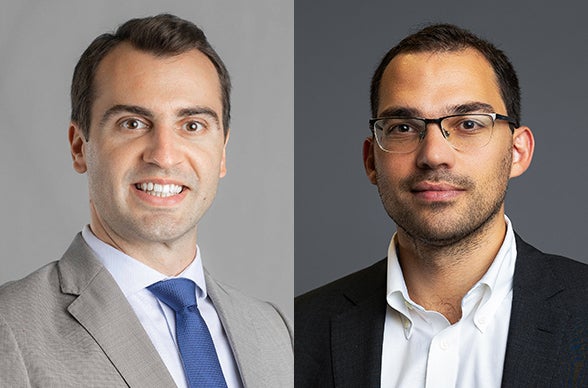
HBKU’s College of Law and Georgetown University in Qatar Launch Joint TradeLab Clinic
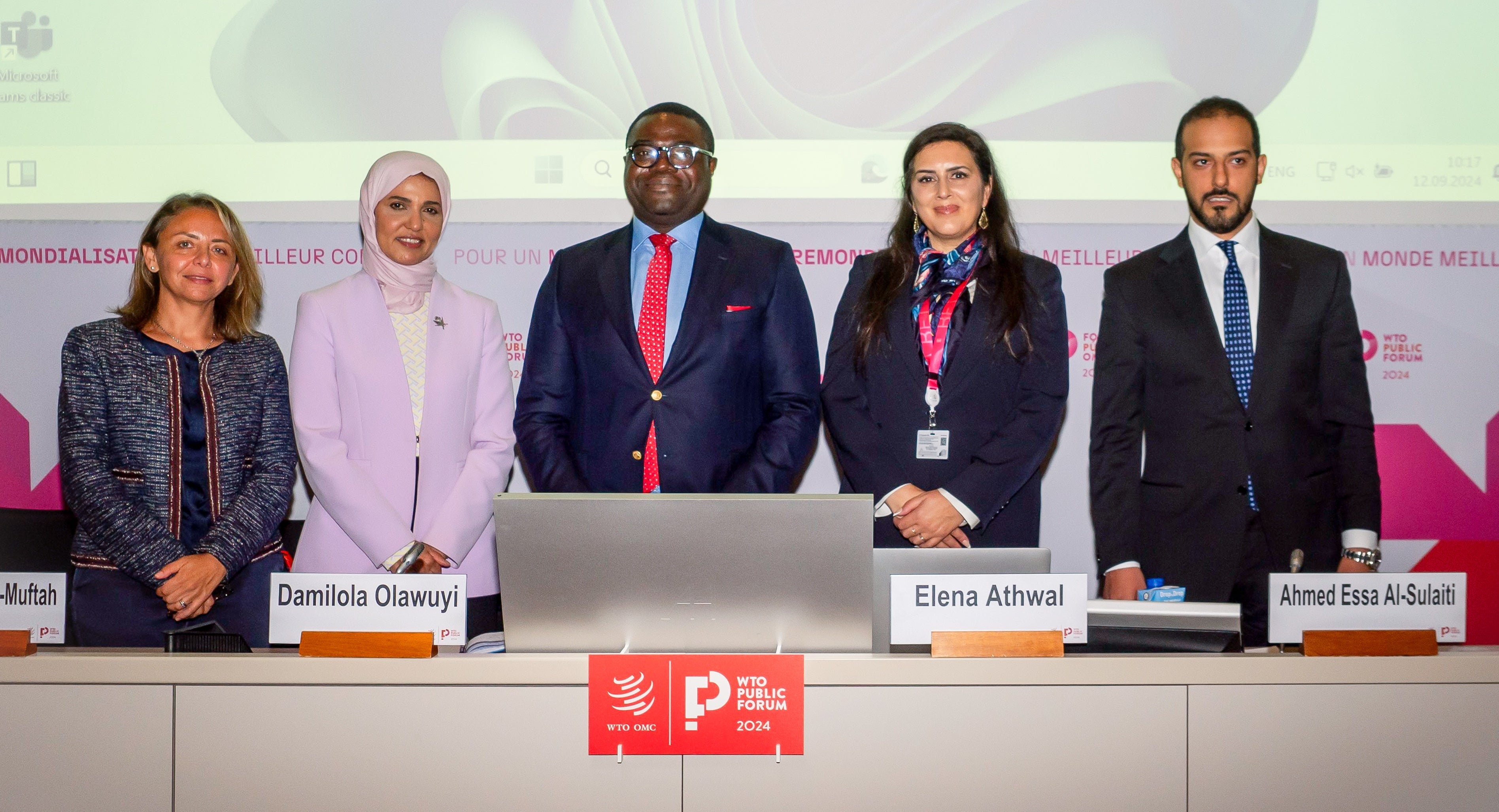
Permanent Mission of the State of Qatar, HBKU, and WTO Hold Discussion on Sustainable Trade at WTO Public Forum
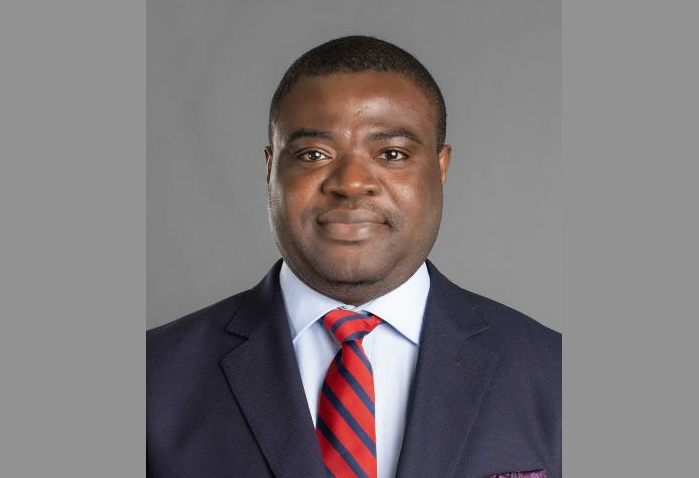
Permanent Mission of the State of Qatar, HBKU and WTO to Host Session at the World Trade Organization Annual Forum
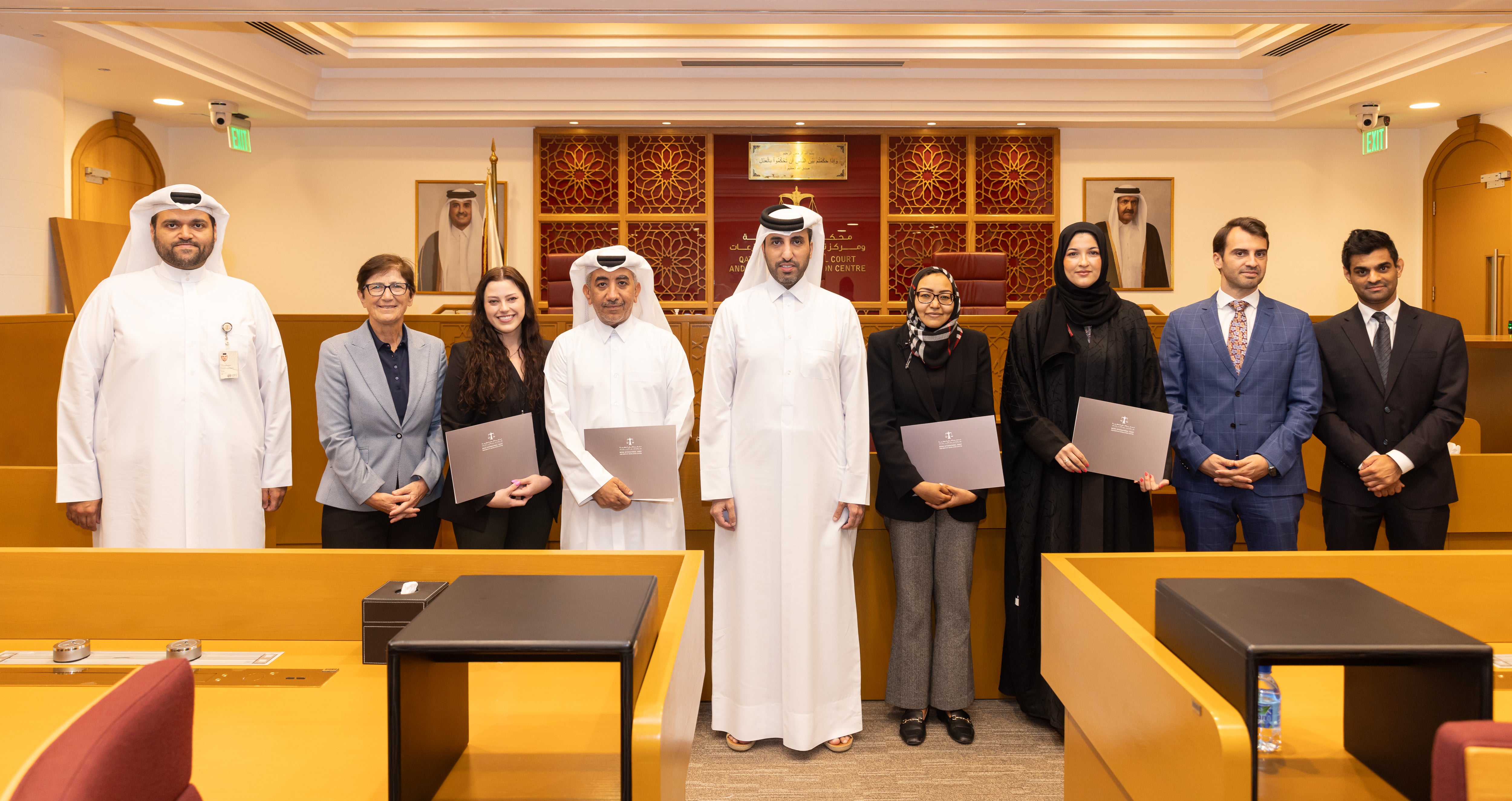
Qatar International Court and Dispute Resolution Centre Honors HBKU College of Law Students
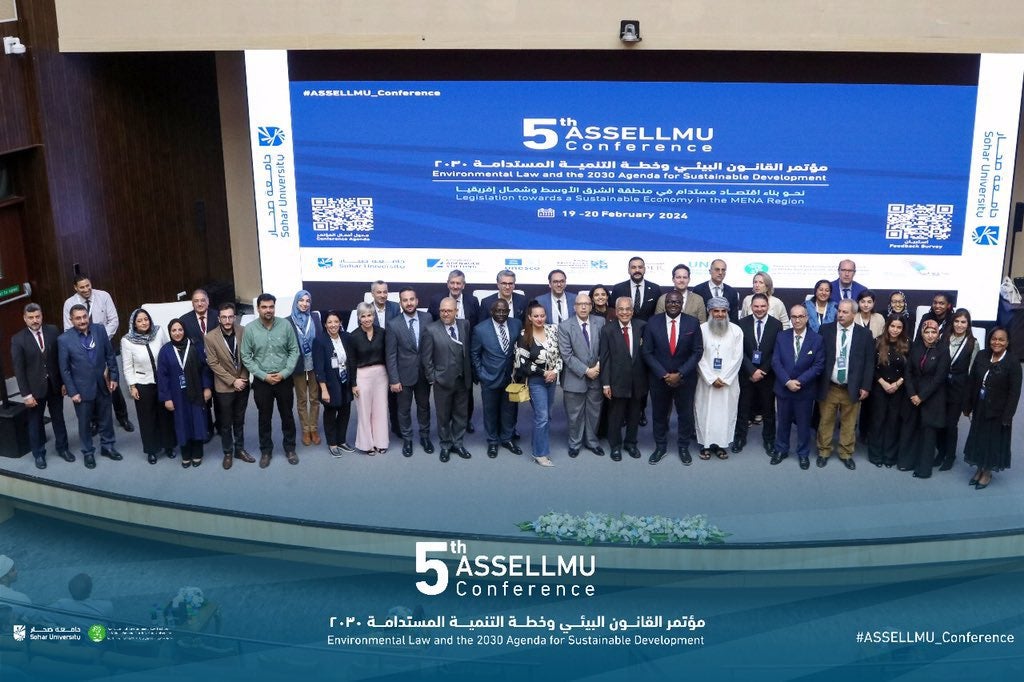
HBKU’s College of Law Co-hosts MENA Environmental Law and Policy Scholars’ Conference in Oman
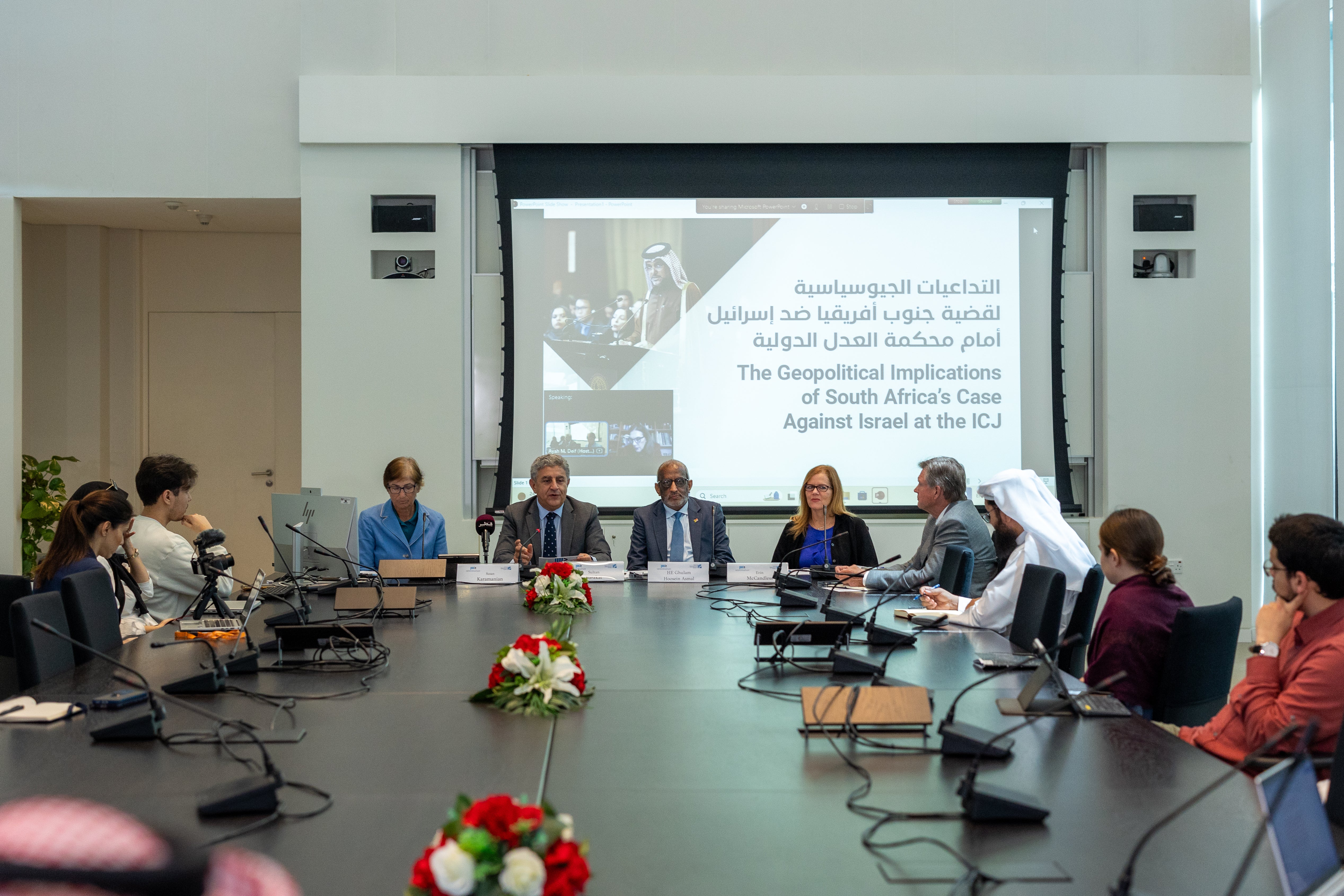
GISR Panel Analyzes Geopolitical Implications of South Africa’s Case against Israel at the ICJ
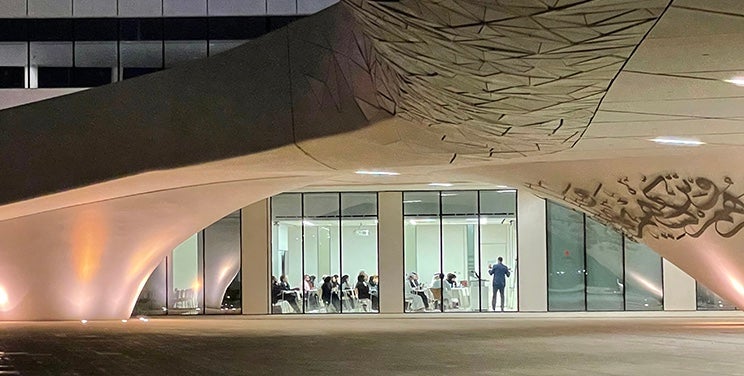
WIPO Academy and Qatar Ministry of Commerce and Industry Support College of Law with Intellectual Property Seminar
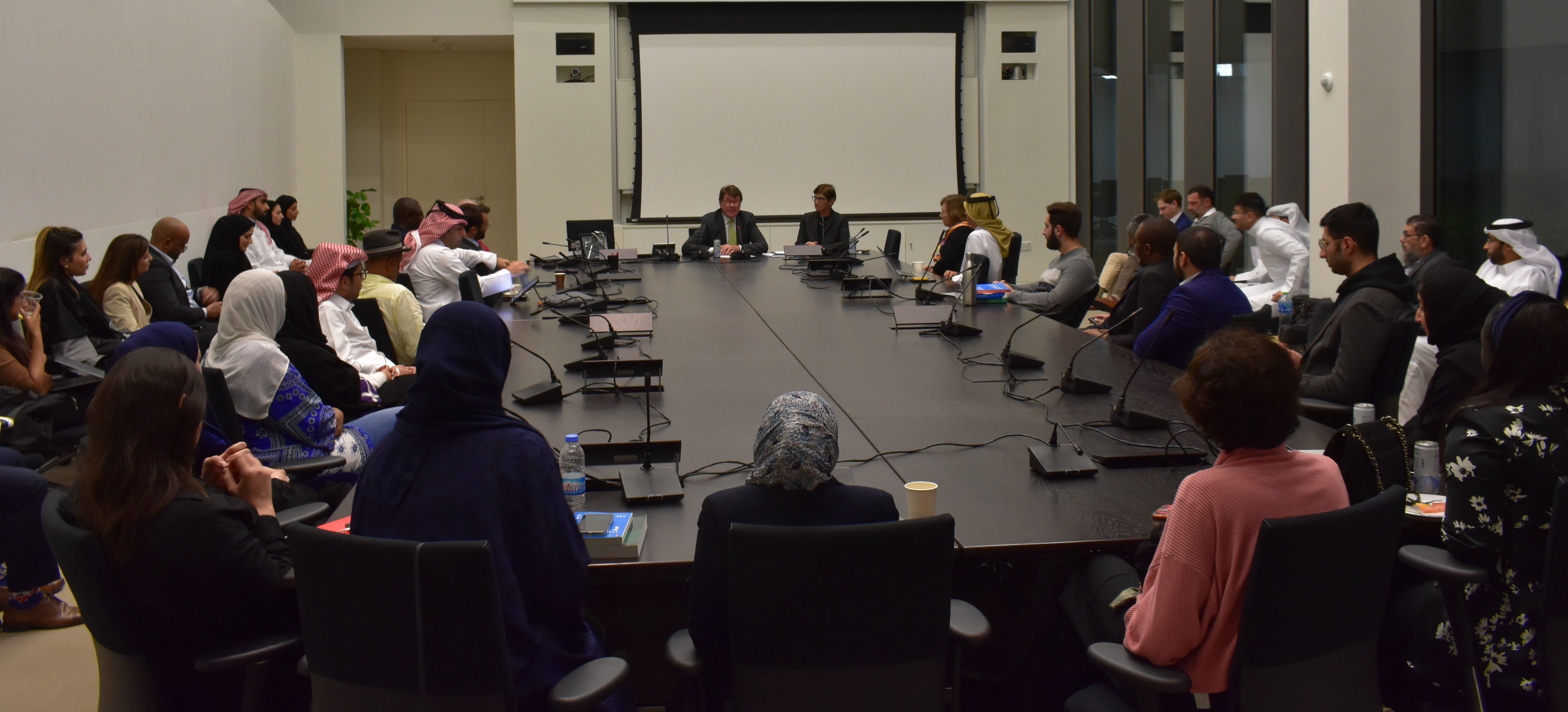
HBKU College of Law Hosts Third Clinton W. Francis Lecture in Legal Professionalism
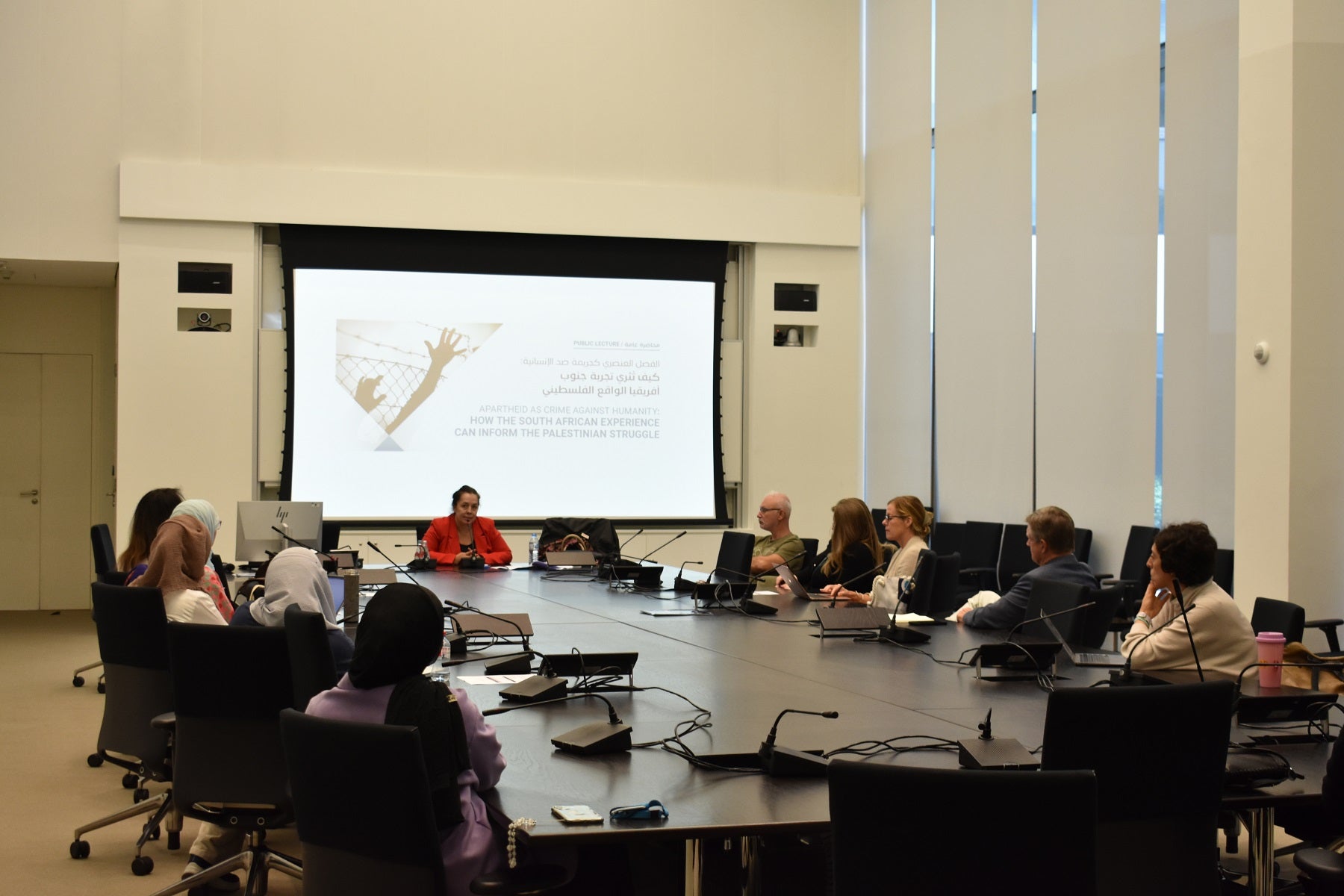
College of Law Holds Public Lecture on How Apartheid Can Inform the Palestinian Struggle
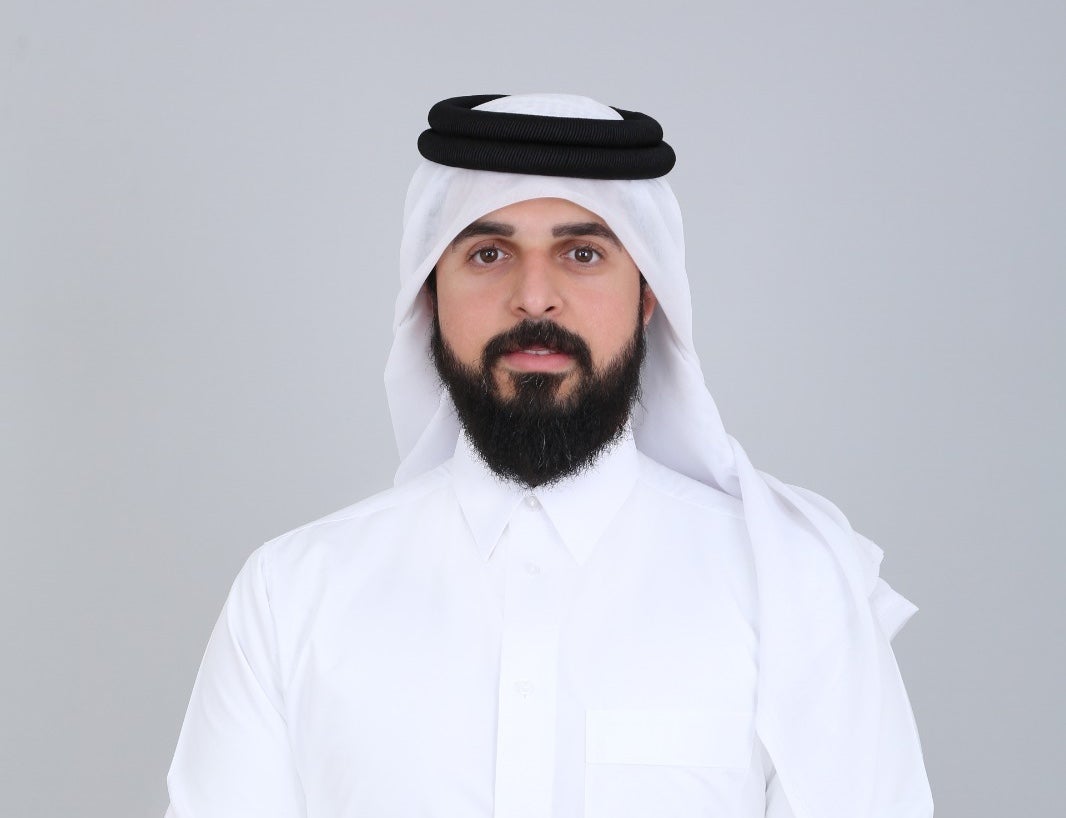
HBKU College of Law Lecturer Appointed to Executive Council of Asian Society of International Law
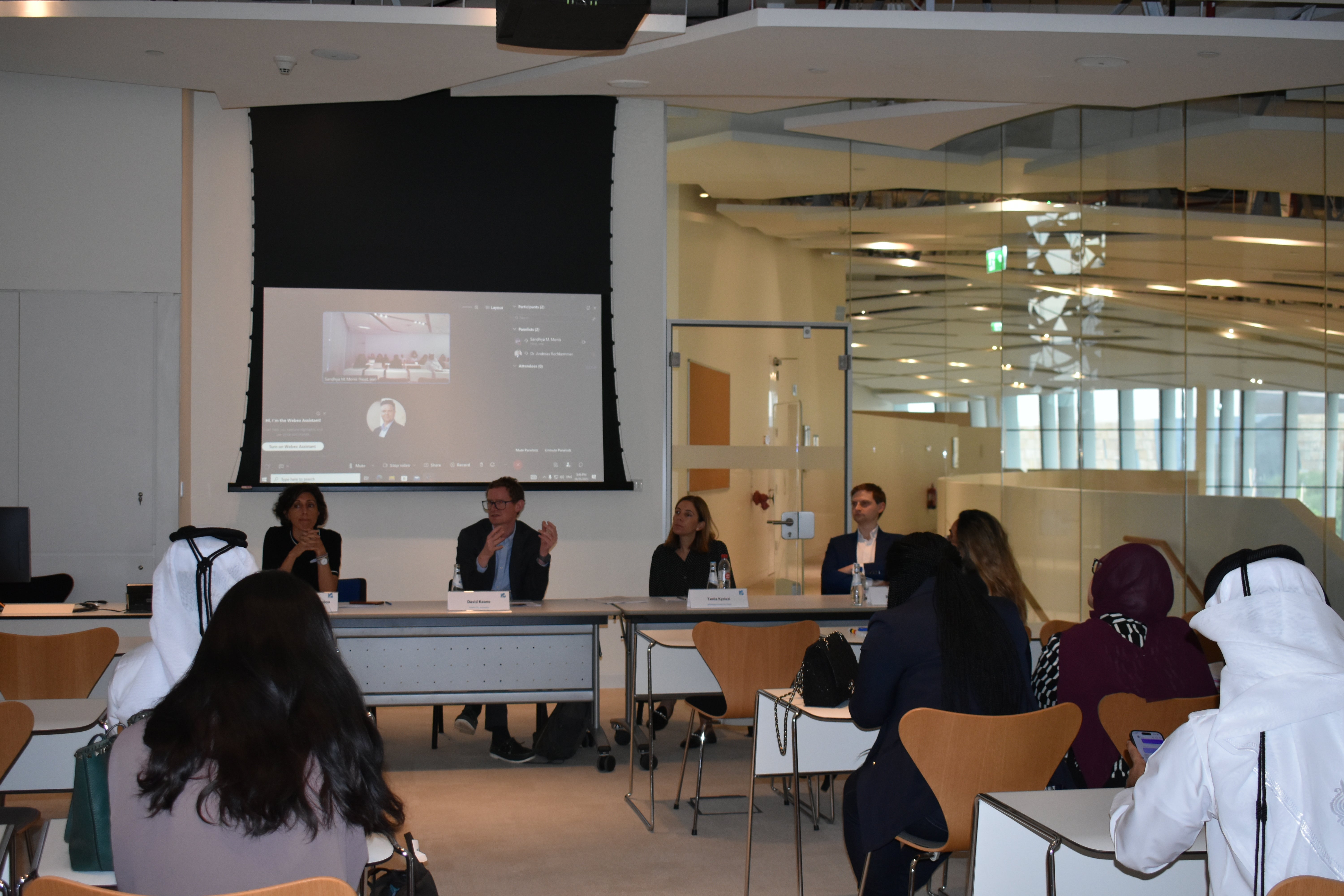
HBKU College of Law Hosts Roundtable on Human Rights in Qatar and the Gulf Region
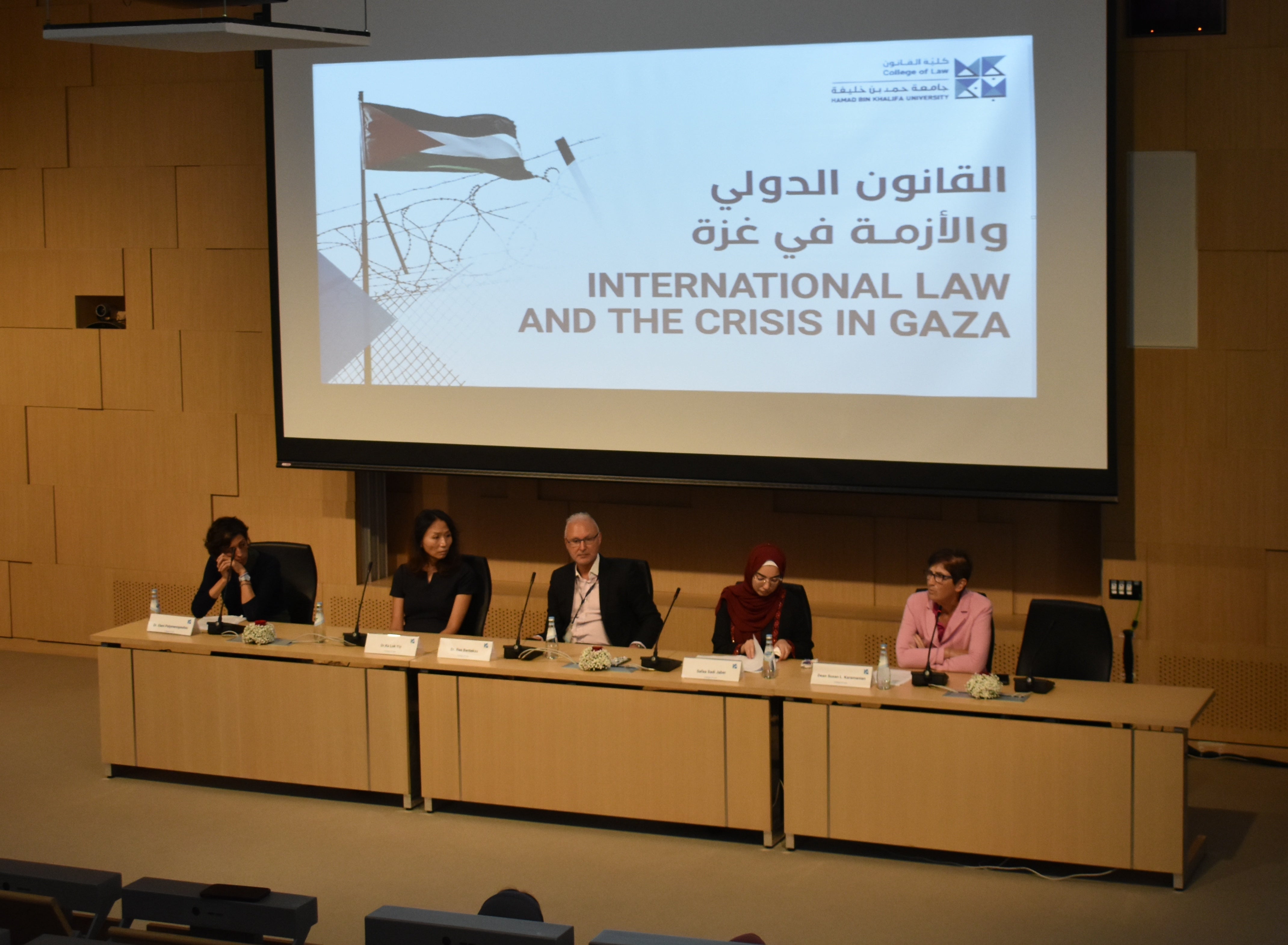
HBKU’s College of Law Panel Examines International Legal Implications of Gaza Crisis
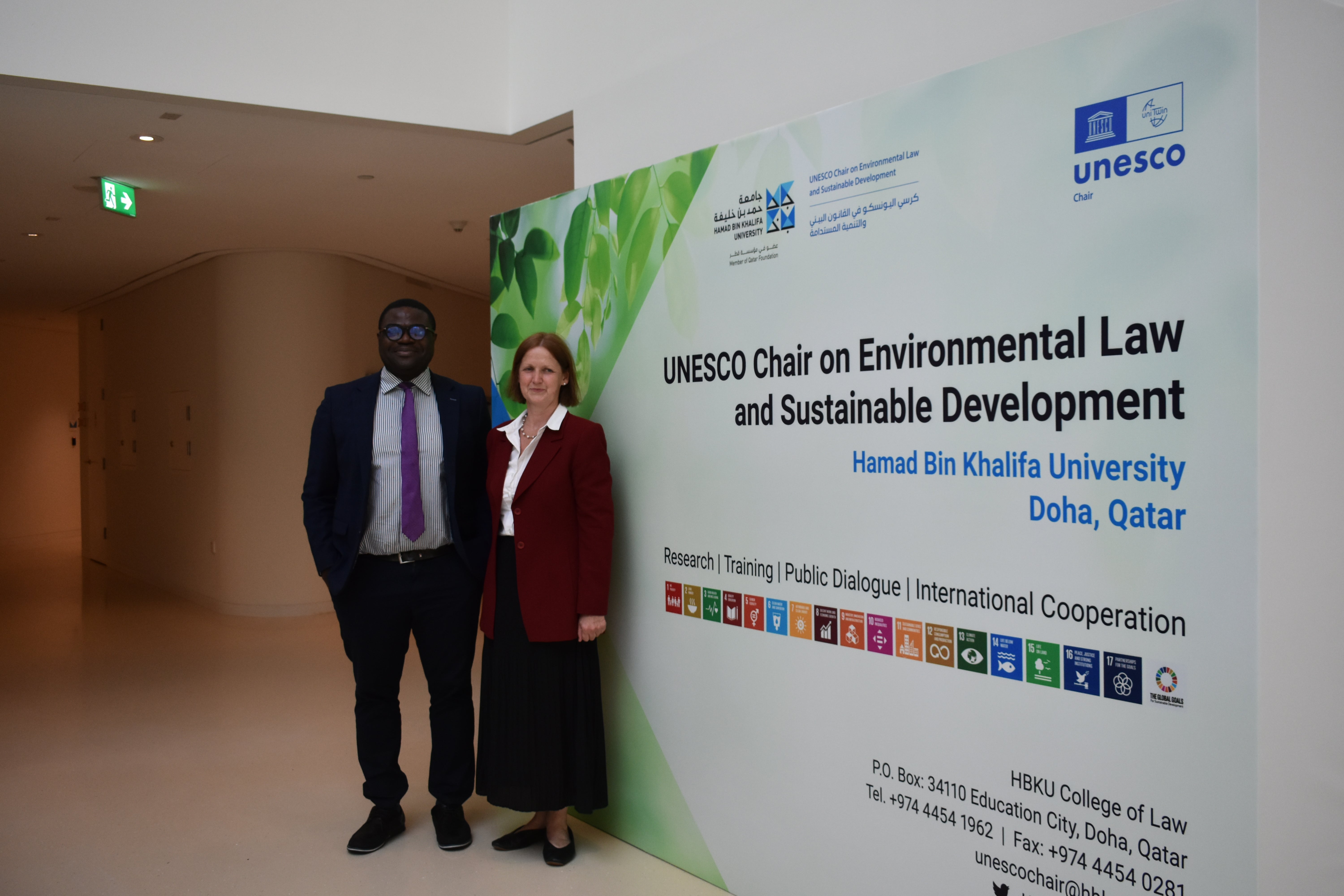
HBKU College of Law Hosts Lecture on Distinguishing Environmental Law from Climate Change Law

HBKU’s College of Law and Georgetown University in Qatar Launch Joint TradeLab Clinic

Permanent Mission of the State of Qatar, HBKU, and WTO Hold Discussion on Sustainable Trade at WTO Public Forum

Permanent Mission of the State of Qatar, HBKU and WTO to Host Session at the World Trade Organization Annual Forum

Qatar International Court and Dispute Resolution Centre Honors HBKU College of Law Students

HBKU’s College of Law Co-hosts MENA Environmental Law and Policy Scholars’ Conference in Oman

GISR Panel Analyzes Geopolitical Implications of South Africa’s Case against Israel at the ICJ

WIPO Academy and Qatar Ministry of Commerce and Industry Support College of Law with Intellectual Property Seminar

HBKU College of Law Hosts Third Clinton W. Francis Lecture in Legal Professionalism

College of Law Holds Public Lecture on How Apartheid Can Inform the Palestinian Struggle

HBKU College of Law Lecturer Appointed to Executive Council of Asian Society of International Law

HBKU College of Law Hosts Roundtable on Human Rights in Qatar and the Gulf Region

HBKU’s College of Law Panel Examines International Legal Implications of Gaza Crisis

HBKU College of Law Hosts Lecture on Distinguishing Environmental Law from Climate Change Law

HBKU’s College of Law and Georgetown University in Qatar Launch Joint TradeLab Clinic

Permanent Mission of the State of Qatar, HBKU, and WTO Hold Discussion on Sustainable Trade at WTO Public Forum

Permanent Mission of the State of Qatar, HBKU and WTO to Host Session at the World Trade Organization Annual Forum

Qatar International Court and Dispute Resolution Centre Honors HBKU College of Law Students

HBKU’s College of Law Co-hosts MENA Environmental Law and Policy Scholars’ Conference in Oman

GISR Panel Analyzes Geopolitical Implications of South Africa’s Case against Israel at the ICJ

WIPO Academy and Qatar Ministry of Commerce and Industry Support College of Law with Intellectual Property Seminar

HBKU College of Law Hosts Third Clinton W. Francis Lecture in Legal Professionalism

College of Law Holds Public Lecture on How Apartheid Can Inform the Palestinian Struggle

HBKU College of Law Lecturer Appointed to Executive Council of Asian Society of International Law

HBKU College of Law Hosts Roundtable on Human Rights in Qatar and the Gulf Region

HBKU’s College of Law Panel Examines International Legal Implications of Gaza Crisis

HBKU College of Law Hosts Lecture on Distinguishing Environmental Law from Climate Change Law

HBKU’s College of Law and Georgetown University in Qatar Launch Joint TradeLab Clinic

Permanent Mission of the State of Qatar, HBKU, and WTO Hold Discussion on Sustainable Trade at WTO Public Forum

Permanent Mission of the State of Qatar, HBKU and WTO to Host Session at the World Trade Organization Annual Forum

Qatar International Court and Dispute Resolution Centre Honors HBKU College of Law Students

HBKU’s College of Law Co-hosts MENA Environmental Law and Policy Scholars’ Conference in Oman

GISR Panel Analyzes Geopolitical Implications of South Africa’s Case against Israel at the ICJ

WIPO Academy and Qatar Ministry of Commerce and Industry Support College of Law with Intellectual Property Seminar

HBKU College of Law Hosts Third Clinton W. Francis Lecture in Legal Professionalism

College of Law Holds Public Lecture on How Apartheid Can Inform the Palestinian Struggle

HBKU College of Law Lecturer Appointed to Executive Council of Asian Society of International Law

HBKU College of Law Hosts Roundtable on Human Rights in Qatar and the Gulf Region

HBKU’s College of Law Panel Examines International Legal Implications of Gaza Crisis

HBKU College of Law Hosts Lecture on Distinguishing Environmental Law from Climate Change Law

HBKU’s College of Law and Georgetown University in Qatar Launch Joint TradeLab Clinic

Permanent Mission of the State of Qatar, HBKU, and WTO Hold Discussion on Sustainable Trade at WTO Public Forum

Permanent Mission of the State of Qatar, HBKU and WTO to Host Session at the World Trade Organization Annual Forum

Qatar International Court and Dispute Resolution Centre Honors HBKU College of Law Students

HBKU’s College of Law Co-hosts MENA Environmental Law and Policy Scholars’ Conference in Oman

GISR Panel Analyzes Geopolitical Implications of South Africa’s Case against Israel at the ICJ

WIPO Academy and Qatar Ministry of Commerce and Industry Support College of Law with Intellectual Property Seminar

HBKU College of Law Hosts Third Clinton W. Francis Lecture in Legal Professionalism

College of Law Holds Public Lecture on How Apartheid Can Inform the Palestinian Struggle

HBKU College of Law Lecturer Appointed to Executive Council of Asian Society of International Law

HBKU College of Law Hosts Roundtable on Human Rights in Qatar and the Gulf Region

HBKU’s College of Law Panel Examines International Legal Implications of Gaza Crisis

HBKU College of Law Hosts Lecture on Distinguishing Environmental Law from Climate Change Law

HBKU’s College of Law and Georgetown University in Qatar Launch Joint TradeLab Clinic

Permanent Mission of the State of Qatar, HBKU, and WTO Hold Discussion on Sustainable Trade at WTO Public Forum

Permanent Mission of the State of Qatar, HBKU and WTO to Host Session at the World Trade Organization Annual Forum

Qatar International Court and Dispute Resolution Centre Honors HBKU College of Law Students

HBKU’s College of Law Co-hosts MENA Environmental Law and Policy Scholars’ Conference in Oman

GISR Panel Analyzes Geopolitical Implications of South Africa’s Case against Israel at the ICJ

WIPO Academy and Qatar Ministry of Commerce and Industry Support College of Law with Intellectual Property Seminar

HBKU College of Law Hosts Third Clinton W. Francis Lecture in Legal Professionalism

College of Law Holds Public Lecture on How Apartheid Can Inform the Palestinian Struggle

HBKU College of Law Lecturer Appointed to Executive Council of Asian Society of International Law

HBKU College of Law Hosts Roundtable on Human Rights in Qatar and the Gulf Region

HBKU’s College of Law Panel Examines International Legal Implications of Gaza Crisis

HBKU College of Law Hosts Lecture on Distinguishing Environmental Law from Climate Change Law

HBKU’s College of Law and Georgetown University in Qatar Launch Joint TradeLab Clinic

Permanent Mission of the State of Qatar, HBKU, and WTO Hold Discussion on Sustainable Trade at WTO Public Forum

Permanent Mission of the State of Qatar, HBKU and WTO to Host Session at the World Trade Organization Annual Forum

Qatar International Court and Dispute Resolution Centre Honors HBKU College of Law Students

HBKU’s College of Law Co-hosts MENA Environmental Law and Policy Scholars’ Conference in Oman

GISR Panel Analyzes Geopolitical Implications of South Africa’s Case against Israel at the ICJ

WIPO Academy and Qatar Ministry of Commerce and Industry Support College of Law with Intellectual Property Seminar

HBKU College of Law Hosts Third Clinton W. Francis Lecture in Legal Professionalism

College of Law Holds Public Lecture on How Apartheid Can Inform the Palestinian Struggle

HBKU College of Law Lecturer Appointed to Executive Council of Asian Society of International Law

HBKU College of Law Hosts Roundtable on Human Rights in Qatar and the Gulf Region

HBKU’s College of Law Panel Examines International Legal Implications of Gaza Crisis

HBKU College of Law Hosts Lecture on Distinguishing Environmental Law from Climate Change Law

HBKU’s College of Law and Georgetown University in Qatar Launch Joint TradeLab Clinic

Permanent Mission of the State of Qatar, HBKU, and WTO Hold Discussion on Sustainable Trade at WTO Public Forum

Permanent Mission of the State of Qatar, HBKU and WTO to Host Session at the World Trade Organization Annual Forum

Qatar International Court and Dispute Resolution Centre Honors HBKU College of Law Students

HBKU’s College of Law Co-hosts MENA Environmental Law and Policy Scholars’ Conference in Oman

GISR Panel Analyzes Geopolitical Implications of South Africa’s Case against Israel at the ICJ

WIPO Academy and Qatar Ministry of Commerce and Industry Support College of Law with Intellectual Property Seminar

HBKU College of Law Hosts Third Clinton W. Francis Lecture in Legal Professionalism

College of Law Holds Public Lecture on How Apartheid Can Inform the Palestinian Struggle

HBKU College of Law Lecturer Appointed to Executive Council of Asian Society of International Law

HBKU College of Law Hosts Roundtable on Human Rights in Qatar and the Gulf Region

HBKU’s College of Law Panel Examines International Legal Implications of Gaza Crisis

HBKU College of Law Hosts Lecture on Distinguishing Environmental Law from Climate Change Law

HBKU’s College of Law and Georgetown University in Qatar Launch Joint TradeLab Clinic

Permanent Mission of the State of Qatar, HBKU, and WTO Hold Discussion on Sustainable Trade at WTO Public Forum

Permanent Mission of the State of Qatar, HBKU and WTO to Host Session at the World Trade Organization Annual Forum

Qatar International Court and Dispute Resolution Centre Honors HBKU College of Law Students

HBKU’s College of Law Co-hosts MENA Environmental Law and Policy Scholars’ Conference in Oman

GISR Panel Analyzes Geopolitical Implications of South Africa’s Case against Israel at the ICJ

WIPO Academy and Qatar Ministry of Commerce and Industry Support College of Law with Intellectual Property Seminar

HBKU College of Law Hosts Third Clinton W. Francis Lecture in Legal Professionalism

College of Law Holds Public Lecture on How Apartheid Can Inform the Palestinian Struggle

HBKU College of Law Lecturer Appointed to Executive Council of Asian Society of International Law

HBKU College of Law Hosts Roundtable on Human Rights in Qatar and the Gulf Region

HBKU’s College of Law Panel Examines International Legal Implications of Gaza Crisis

HBKU College of Law Hosts Lecture on Distinguishing Environmental Law from Climate Change Law

HBKU’s College of Law and Georgetown University in Qatar Launch Joint TradeLab Clinic

Permanent Mission of the State of Qatar, HBKU, and WTO Hold Discussion on Sustainable Trade at WTO Public Forum

Permanent Mission of the State of Qatar, HBKU and WTO to Host Session at the World Trade Organization Annual Forum

Qatar International Court and Dispute Resolution Centre Honors HBKU College of Law Students

HBKU’s College of Law Co-hosts MENA Environmental Law and Policy Scholars’ Conference in Oman

GISR Panel Analyzes Geopolitical Implications of South Africa’s Case against Israel at the ICJ

WIPO Academy and Qatar Ministry of Commerce and Industry Support College of Law with Intellectual Property Seminar

HBKU College of Law Hosts Third Clinton W. Francis Lecture in Legal Professionalism

College of Law Holds Public Lecture on How Apartheid Can Inform the Palestinian Struggle

HBKU College of Law Lecturer Appointed to Executive Council of Asian Society of International Law

HBKU College of Law Hosts Roundtable on Human Rights in Qatar and the Gulf Region

HBKU’s College of Law Panel Examines International Legal Implications of Gaza Crisis

HBKU College of Law Hosts Lecture on Distinguishing Environmental Law from Climate Change Law

HBKU’s College of Law and Georgetown University in Qatar Launch Joint TradeLab Clinic

Permanent Mission of the State of Qatar, HBKU, and WTO Hold Discussion on Sustainable Trade at WTO Public Forum

Permanent Mission of the State of Qatar, HBKU and WTO to Host Session at the World Trade Organization Annual Forum

Qatar International Court and Dispute Resolution Centre Honors HBKU College of Law Students

HBKU’s College of Law Co-hosts MENA Environmental Law and Policy Scholars’ Conference in Oman

GISR Panel Analyzes Geopolitical Implications of South Africa’s Case against Israel at the ICJ

WIPO Academy and Qatar Ministry of Commerce and Industry Support College of Law with Intellectual Property Seminar

HBKU College of Law Hosts Third Clinton W. Francis Lecture in Legal Professionalism

College of Law Holds Public Lecture on How Apartheid Can Inform the Palestinian Struggle

HBKU College of Law Lecturer Appointed to Executive Council of Asian Society of International Law

HBKU College of Law Hosts Roundtable on Human Rights in Qatar and the Gulf Region

HBKU’s College of Law Panel Examines International Legal Implications of Gaza Crisis

HBKU College of Law Hosts Lecture on Distinguishing Environmental Law from Climate Change Law

HBKU’s College of Law and Georgetown University in Qatar Launch Joint TradeLab Clinic

Permanent Mission of the State of Qatar, HBKU, and WTO Hold Discussion on Sustainable Trade at WTO Public Forum

Permanent Mission of the State of Qatar, HBKU and WTO to Host Session at the World Trade Organization Annual Forum

Qatar International Court and Dispute Resolution Centre Honors HBKU College of Law Students

HBKU’s College of Law Co-hosts MENA Environmental Law and Policy Scholars’ Conference in Oman

GISR Panel Analyzes Geopolitical Implications of South Africa’s Case against Israel at the ICJ

WIPO Academy and Qatar Ministry of Commerce and Industry Support College of Law with Intellectual Property Seminar

HBKU College of Law Hosts Third Clinton W. Francis Lecture in Legal Professionalism

College of Law Holds Public Lecture on How Apartheid Can Inform the Palestinian Struggle

HBKU College of Law Lecturer Appointed to Executive Council of Asian Society of International Law

HBKU College of Law Hosts Roundtable on Human Rights in Qatar and the Gulf Region

HBKU’s College of Law Panel Examines International Legal Implications of Gaza Crisis

HBKU College of Law Hosts Lecture on Distinguishing Environmental Law from Climate Change Law

HBKU’s College of Law and Georgetown University in Qatar Launch Joint TradeLab Clinic

Permanent Mission of the State of Qatar, HBKU, and WTO Hold Discussion on Sustainable Trade at WTO Public Forum

Permanent Mission of the State of Qatar, HBKU and WTO to Host Session at the World Trade Organization Annual Forum

Qatar International Court and Dispute Resolution Centre Honors HBKU College of Law Students

HBKU’s College of Law Co-hosts MENA Environmental Law and Policy Scholars’ Conference in Oman

GISR Panel Analyzes Geopolitical Implications of South Africa’s Case against Israel at the ICJ

WIPO Academy and Qatar Ministry of Commerce and Industry Support College of Law with Intellectual Property Seminar

HBKU College of Law Hosts Third Clinton W. Francis Lecture in Legal Professionalism

College of Law Holds Public Lecture on How Apartheid Can Inform the Palestinian Struggle

HBKU College of Law Lecturer Appointed to Executive Council of Asian Society of International Law

HBKU College of Law Hosts Roundtable on Human Rights in Qatar and the Gulf Region

HBKU’s College of Law Panel Examines International Legal Implications of Gaza Crisis

HBKU College of Law Hosts Lecture on Distinguishing Environmental Law from Climate Change Law

HBKU’s College of Law and Georgetown University in Qatar Launch Joint TradeLab Clinic

Permanent Mission of the State of Qatar, HBKU, and WTO Hold Discussion on Sustainable Trade at WTO Public Forum

Permanent Mission of the State of Qatar, HBKU and WTO to Host Session at the World Trade Organization Annual Forum

Qatar International Court and Dispute Resolution Centre Honors HBKU College of Law Students

HBKU’s College of Law Co-hosts MENA Environmental Law and Policy Scholars’ Conference in Oman

GISR Panel Analyzes Geopolitical Implications of South Africa’s Case against Israel at the ICJ

WIPO Academy and Qatar Ministry of Commerce and Industry Support College of Law with Intellectual Property Seminar

HBKU College of Law Hosts Third Clinton W. Francis Lecture in Legal Professionalism

College of Law Holds Public Lecture on How Apartheid Can Inform the Palestinian Struggle

HBKU College of Law Lecturer Appointed to Executive Council of Asian Society of International Law

HBKU College of Law Hosts Roundtable on Human Rights in Qatar and the Gulf Region

HBKU’s College of Law Panel Examines International Legal Implications of Gaza Crisis

HBKU College of Law Hosts Lecture on Distinguishing Environmental Law from Climate Change Law

HBKU’s College of Law and Georgetown University in Qatar Launch Joint TradeLab Clinic

Permanent Mission of the State of Qatar, HBKU, and WTO Hold Discussion on Sustainable Trade at WTO Public Forum

Permanent Mission of the State of Qatar, HBKU and WTO to Host Session at the World Trade Organization Annual Forum

Qatar International Court and Dispute Resolution Centre Honors HBKU College of Law Students

HBKU’s College of Law Co-hosts MENA Environmental Law and Policy Scholars’ Conference in Oman

GISR Panel Analyzes Geopolitical Implications of South Africa’s Case against Israel at the ICJ

WIPO Academy and Qatar Ministry of Commerce and Industry Support College of Law with Intellectual Property Seminar

HBKU College of Law Hosts Third Clinton W. Francis Lecture in Legal Professionalism

College of Law Holds Public Lecture on How Apartheid Can Inform the Palestinian Struggle

HBKU College of Law Lecturer Appointed to Executive Council of Asian Society of International Law

HBKU College of Law Hosts Roundtable on Human Rights in Qatar and the Gulf Region

HBKU’s College of Law Panel Examines International Legal Implications of Gaza Crisis

HBKU College of Law Hosts Lecture on Distinguishing Environmental Law from Climate Change Law

HBKU’s College of Law and Georgetown University in Qatar Launch Joint TradeLab Clinic

Permanent Mission of the State of Qatar, HBKU, and WTO Hold Discussion on Sustainable Trade at WTO Public Forum

Permanent Mission of the State of Qatar, HBKU and WTO to Host Session at the World Trade Organization Annual Forum

Qatar International Court and Dispute Resolution Centre Honors HBKU College of Law Students

HBKU’s College of Law Co-hosts MENA Environmental Law and Policy Scholars’ Conference in Oman

GISR Panel Analyzes Geopolitical Implications of South Africa’s Case against Israel at the ICJ

WIPO Academy and Qatar Ministry of Commerce and Industry Support College of Law with Intellectual Property Seminar

HBKU College of Law Hosts Third Clinton W. Francis Lecture in Legal Professionalism

College of Law Holds Public Lecture on How Apartheid Can Inform the Palestinian Struggle

HBKU College of Law Lecturer Appointed to Executive Council of Asian Society of International Law

HBKU College of Law Hosts Roundtable on Human Rights in Qatar and the Gulf Region

HBKU’s College of Law Panel Examines International Legal Implications of Gaza Crisis

HBKU College of Law Hosts Lecture on Distinguishing Environmental Law from Climate Change Law

HBKU’s College of Law and Georgetown University in Qatar Launch Joint TradeLab Clinic

Permanent Mission of the State of Qatar, HBKU, and WTO Hold Discussion on Sustainable Trade at WTO Public Forum

Permanent Mission of the State of Qatar, HBKU and WTO to Host Session at the World Trade Organization Annual Forum

Qatar International Court and Dispute Resolution Centre Honors HBKU College of Law Students

HBKU’s College of Law Co-hosts MENA Environmental Law and Policy Scholars’ Conference in Oman

GISR Panel Analyzes Geopolitical Implications of South Africa’s Case against Israel at the ICJ

WIPO Academy and Qatar Ministry of Commerce and Industry Support College of Law with Intellectual Property Seminar

HBKU College of Law Hosts Third Clinton W. Francis Lecture in Legal Professionalism

College of Law Holds Public Lecture on How Apartheid Can Inform the Palestinian Struggle

HBKU College of Law Lecturer Appointed to Executive Council of Asian Society of International Law

HBKU College of Law Hosts Roundtable on Human Rights in Qatar and the Gulf Region

HBKU’s College of Law Panel Examines International Legal Implications of Gaza Crisis

HBKU College of Law Hosts Lecture on Distinguishing Environmental Law from Climate Change Law

HBKU’s College of Law and Georgetown University in Qatar Launch Joint TradeLab Clinic

Permanent Mission of the State of Qatar, HBKU, and WTO Hold Discussion on Sustainable Trade at WTO Public Forum

Permanent Mission of the State of Qatar, HBKU and WTO to Host Session at the World Trade Organization Annual Forum

Qatar International Court and Dispute Resolution Centre Honors HBKU College of Law Students

HBKU’s College of Law Co-hosts MENA Environmental Law and Policy Scholars’ Conference in Oman

GISR Panel Analyzes Geopolitical Implications of South Africa’s Case against Israel at the ICJ

WIPO Academy and Qatar Ministry of Commerce and Industry Support College of Law with Intellectual Property Seminar

HBKU College of Law Hosts Third Clinton W. Francis Lecture in Legal Professionalism

College of Law Holds Public Lecture on How Apartheid Can Inform the Palestinian Struggle

HBKU College of Law Lecturer Appointed to Executive Council of Asian Society of International Law

HBKU College of Law Hosts Roundtable on Human Rights in Qatar and the Gulf Region

HBKU’s College of Law Panel Examines International Legal Implications of Gaza Crisis

HBKU College of Law Hosts Lecture on Distinguishing Environmental Law from Climate Change Law

HBKU’s College of Law and Georgetown University in Qatar Launch Joint TradeLab Clinic

Permanent Mission of the State of Qatar, HBKU, and WTO Hold Discussion on Sustainable Trade at WTO Public Forum

Permanent Mission of the State of Qatar, HBKU and WTO to Host Session at the World Trade Organization Annual Forum

Qatar International Court and Dispute Resolution Centre Honors HBKU College of Law Students

HBKU’s College of Law Co-hosts MENA Environmental Law and Policy Scholars’ Conference in Oman

GISR Panel Analyzes Geopolitical Implications of South Africa’s Case against Israel at the ICJ

WIPO Academy and Qatar Ministry of Commerce and Industry Support College of Law with Intellectual Property Seminar

HBKU College of Law Hosts Third Clinton W. Francis Lecture in Legal Professionalism

College of Law Holds Public Lecture on How Apartheid Can Inform the Palestinian Struggle

HBKU College of Law Lecturer Appointed to Executive Council of Asian Society of International Law

HBKU College of Law Hosts Roundtable on Human Rights in Qatar and the Gulf Region

HBKU’s College of Law Panel Examines International Legal Implications of Gaza Crisis

HBKU College of Law Hosts Lecture on Distinguishing Environmental Law from Climate Change Law

HBKU’s College of Law and Georgetown University in Qatar Launch Joint TradeLab Clinic

Permanent Mission of the State of Qatar, HBKU, and WTO Hold Discussion on Sustainable Trade at WTO Public Forum

Permanent Mission of the State of Qatar, HBKU and WTO to Host Session at the World Trade Organization Annual Forum

Qatar International Court and Dispute Resolution Centre Honors HBKU College of Law Students

HBKU’s College of Law Co-hosts MENA Environmental Law and Policy Scholars’ Conference in Oman

GISR Panel Analyzes Geopolitical Implications of South Africa’s Case against Israel at the ICJ

WIPO Academy and Qatar Ministry of Commerce and Industry Support College of Law with Intellectual Property Seminar

HBKU College of Law Hosts Third Clinton W. Francis Lecture in Legal Professionalism

College of Law Holds Public Lecture on How Apartheid Can Inform the Palestinian Struggle

HBKU College of Law Lecturer Appointed to Executive Council of Asian Society of International Law

HBKU College of Law Hosts Roundtable on Human Rights in Qatar and the Gulf Region

HBKU’s College of Law Panel Examines International Legal Implications of Gaza Crisis






